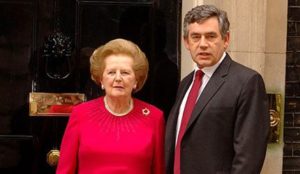 by Colin Fox – SSP joint national spokesperson
by Colin Fox – SSP joint national spokesperson
‘The Bank of England is not very confident about the future of the UK economy’ concluded BBC Economics Editor Kamal Ahmed rather understating the news that Governor Mark Carney had cut base rates by 0.25% to 0.25%.
The decision to cut interest rates to their lowest ever level followed the Bank of England’s largest ‘downgrade’ in economic growth forecasts in its history. News of the interest rate cut surprised few observers yet it confirmed the widespread criticisms of Carney that he had been wildly optimistic in the picture he had painted of the UK economy in his past Monetary Policy Committee reports.
‘Not very confident’ and neither should he have been. All the evidence has shown for some time that the UK economy was fast approaching another recession. This would have happened regardless of the EU referendum vote but ‘Remainers’ have nonetheless been quick to apportion blame for it to the ‘Brexit’ result.
The last recession in 2009 followed the financial collapse of 2008 which the Adam Smith Institute this week predicted was about to be repeated. That collapse was caused by a lethal combination of banking greed and reckless stupidity and led to an unprecedented publicly funded bailout of the private banking sector. But that colossal bail-out failed to stimulate the economy and what followed was a period of miniscule growth. Now Britain’s economy is ‘heading south’ once again.
 All of which will remind SSP members old enough to remember of Gordon Brown, Labour’s Chancellor in the 2000’s, who famously and foolishly claimed to have banished ‘the boom bust cycle of British capitalism’ for ever. What a clot.
All of which will remind SSP members old enough to remember of Gordon Brown, Labour’s Chancellor in the 2000’s, who famously and foolishly claimed to have banished ‘the boom bust cycle of British capitalism’ for ever. What a clot.
This latest ‘bust’ has been widely anticipated. The North Sea oil industry has shed 85,000 jobs in the last year alone with further significant redundancies likely. The manufacturing and services sectors are already slowing markedly. BHS for example is not expected to be the last casualty in the sharply contracting retail sector.
The Resolution Foundation published a report this week that concluded average household incomes would fall by £680 by 2018 as a result of a 2.5% reduction in economic activity. This follows analysis by the TUC based on OECD figures that revealed, virtually alone among 35 industrial nations, that UK workers have seen a 10% fall in average wages since 2007. In other words wages and conditions here have shrunk significantly since the last recession and here we are on the verge of another sharp decline.
[x_pullquote type=”right”]Britain today more than ever is a low wage, underemployed and casually employed economy.[/x_pullquote]The reason for this imminent contraction is not difficult to fathom. Any cursory glance through the financial pages of the newspapers will show the extent of the gloom felt across industry from the Purchasing Managers Index to the CBI. The slowdown in the world economy – particularly although not exclusively in China – the collapse in oil prices and above all the effects of supra-exploitation of workers across the western world through poverty wages and casualisation has led inevitably to this latest slump in the UK economy.Karl Marx was the first to highlight this inherent contradiction of capitalism when he showed the more employers forced down the living standards of their workers the less they had to spend on the goods and services those employers produced. Britain today more than ever is a low wage, underemployed and casually employed economy.
Scotland’s economy is already in deep trouble say analysts such as the Fraser of Allander Institute. And it is possible we will be the first part of the UK to enter recession. Scotland can therefore expect to see more job losses and further attacks on pay and conditions – like those the RMT are fighting in the North Sea oil industry at the moment – right across the economy in the weeks and months ahead as the recession bites. There is no doubt this recession and its consequences for working class people will dominate Scottish politics and pose huge questions for all the capitalist parties at Holyrood.
Main Photo: Bank of England
